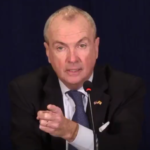“Millionaires Tax” Not the NJ Fairy Tale Governor Murphy is Selling
 By Rosemary Becchi, J.D., L.L.M.
By Rosemary Becchi, J.D., L.L.M.
We all know how the story goes: Steal from the rich and give to the poor. In the story, it’s noble and righteous for the hero to take these actions. So, it’s no surprise that Governor Phil Murphy believes he can sell New Jerseyans on an economic proposal known as the “Millionaires Tax”. Unfortunately, this isn’t a story, and the Millionaires Tax doesn’t steal from the rich to give to the poor. In fact, it steals from small businesses and gives to the bureaucracy of our state government that has proven unwilling and unable to make tough spending decisions.
Murphy’s story goes something like this: New Jersey will raise the state income tax rate for residents who earn more than $1 million, and this will supposedly produce more than $765 million in new state revenue. Currently, the state’s personal income tax rate tops out at 8.97 percent on income over $500,000. Governor Murphy’s proposed Millionaires Tax would increase the marginal tax rate applied to income above $1 million to 10.75 percent.
So who exactly are these “millionaires”? In large part, they are small business owners, many of whom make up the backbone of New Jersey’s economy. This tax doesn’t simply target super wealthy people, it targets hard working individuals who despite an awful economic climate in New Jersey, have found ways to make their businesses successful.
Most small business owners pay taxes on the income that their businesses earn on their personal tax return. If Governor Murphy is successful in enacting the Millionaires Tax, it would immediately increase taxes on small business owners. So instead of hiring new employees, buying more equipment, or expanding their operations, small business owners will have to spend that money to pay higher taxes.
I recently spoke to a small retail business owner who has several stores in New Jersey. He said that when expenses such as taxes go up, he has two choices: Either increase revenue or cut expenses. To increase revenue, he would have to raise his prices, which will drive his customers away; or he can try to increase the number of customers he has, which would require him to spend more money to keep the lights on longer. Since he is limited on how much new revenue he can generate, he will need to cut expenses immediately in order to pay the increase in taxes, which means he will likely cut the number of employees he has working for him.
Raising taxes and stifling growth can’t be the answer we want in New Jersey. We need to enact policies that will expand opportunities and allow for new and good paying jobs to be created. Taxes such as the Millionaires Tax drive businesses away and lead to another problem we are facing, the migration of individuals out of New Jersey each year. New Jersey continues to have one of the highest rates of residents moving to other states, many of whom felt the tax burden was too high and that they could find a better quality of economic life in low-tax states like Florida and Texas.
We all have heard from families, neighbors and co-workers who have said, “Once the kids graduate, we are out of here,” or “I just can’t afford to run my business in New Jersey any longer.” The solution to New Jersey’s economic problems is not more taxes and unnecessary Trenton programs. It lies in the truth we all know: We love New Jersey. We want to stay and find success here in our home, but we simply can’t afford to pay more in taxes. To make New Jersey a vibrant and attractive state to live, work and play in, we must stop over-burdening individuals, families and businesses and allow them to grow and prosper. Raising taxes again will only make living in New Jersey more difficult and ultimately drive people away.
The time is long past when our government leaders need to stop asking for more. Just like each and everyone of us, our government must live within its means. Yes, that means making tough decisions, but isn’t that what leaders are expected to do?
One initial step we should take is to support State Senate Republican Leader Tom Kean’s constitutional amendment to cap state spending at two percent. Local mayors are required to work within a two percent spending cap, we should expect the same from our governor and state legislature. By comparison, Governor Murphy’s budget includes an 8 percent hike in state spending.
The solution to New Jersey’s problems start and end with a need for developing comprehensive reform around spending, not raising taxes even higher. While Governor Murphy might see himself as Robin Hood selling his Millionaires Tax in this story, it’s quite clear that he is in fact the Sheriff of Nottingham, which didn’t fare well in the story and certainly won’t here in New Jersey.
Rosemary Becchi is the President of Jersey First, an advocacy group fighting for lower taxes in New Jersey. She is a leading tax lawyer who was formerly counsel to the majority staff of the U.S. Senate Finance Committee. She is currently a partner with McGuireWoods LLP.










